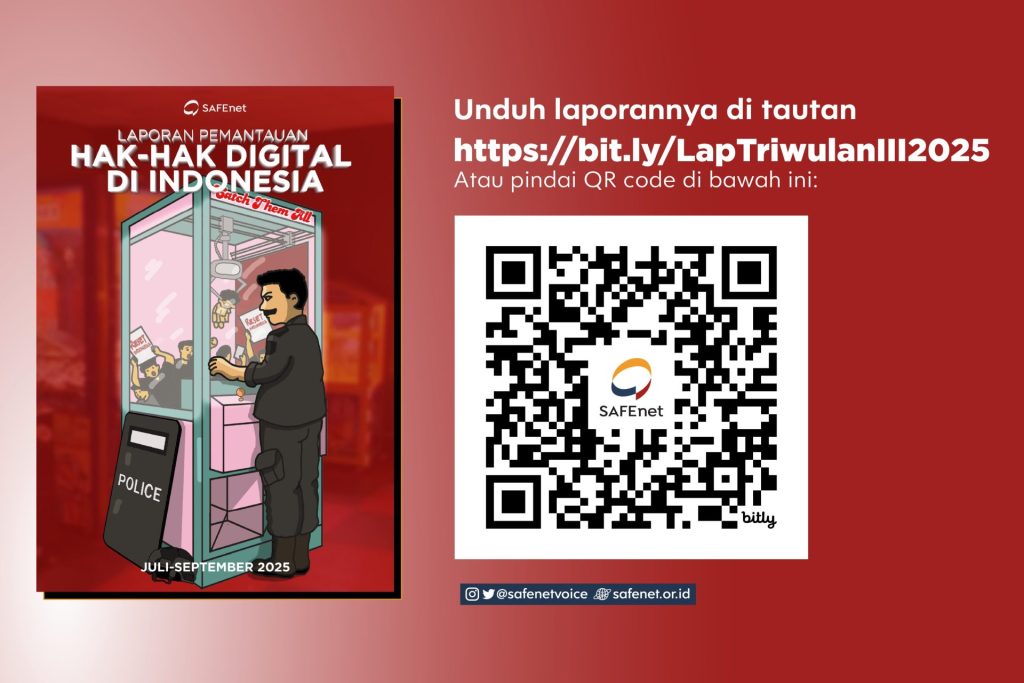
Denpasar, October 29, 2025 – During the third quarter (July-September) of 2025, the Southeast Asia Freedom of Expression Network (SAFEnet) observed a surge in digital repression. One of the factors triggering this surge was the wave of civil demonstrations that erupted in late August to early September 2025. This wave of demonstrations was accompanied by widespread protests on various social media platforms, which were then responded to with cyber police operations by the state. This situation resulted in a significant increase in violations in almost all sectors of digital rights, such as the right to internet access, freedom of expression, and the right to security in the digital realm.
During this period, there were various alleged violations of the right to internet access, both related to demonstrations and otherwise. SAFEnet received complaints about suspended accounts, feature restrictions, and access difficulties on Instagram, TikTok, and WhatsApp. In fact, during the demonstrations in Jakarta at the end of August, TikTok suddenly and deliberately suspended the TikTok LIVE broadcast feature in Indonesia for safety reasons. Additionally, in Jakarta, thousands of demonstrators during the protests from August 25-30 also experienced access disruptions.
“Access and feature restrictions imposed by digital platforms during the protest period highlight theweak protection of the right to internet access in Indonesia,” said Tessa, one of the authors of the third- quarter 2025 report.
In terms of freedom of expression, there were a total of 59 cases of violations of freedom of expression in the digital realm, with 156 people reported. Political motives or issues were the most common reason behind violations of freedom of expression, with a total of 128 victims. This was mainly related to political expressions of support for the August 2025 demonstrations. The victims reported during this period included a number of young activists, such as Delpedro Marhaen (Lokataru Foundation), Muzaffar Salim (Lokataru Foundation), Khariq Anhar (Student Plaintiff Alliance), Syahdan Husein (Gejayan Memanggil), and Muhammad Fakhrurrozi (Social Movement Institute). Although it has been revised to tighten the scope for interpretation, SAFEnet notes that Article 28 paragraph (2) of the ITE Law concerning hate speech is still the most widely used to criminalize, with 45 people reported. In addition, the ITE Law without further information on specific articles has resulted in 67 people being reported.
“The vague articles in the ITE Law continue to be a tool for silencing, indicating that there is still no real guarantee of freedom of expression in the digital space,” said Tessa.
SAFEnet also recorded 299 digital security incidents during July-September 2025. A total of 129 of these incidents were related to criticism and protests by citizens against government policies or were politically motivated. The explosion of incidents was triggered by demonstrations in various cities, accompanied by widespread critical expressions against the government on social media. Ordinary citizens were the most affected group, with the dominant attacks being device confiscation (15 cases) and data extraction (15 cases), followed by threats (6 cases) and doxing (5 cases). NGO staff and activists also experienced similar attacks, including 4 cases of confiscation and 3 cases of data extraction from their devices.
Tessa added, “The surge in digital attacks against citizens and activists shows how the online space is increasingly vulnerable for those who voice criticism of the government.”
During the third quarter, SAFEnet also found at least 605 cases of online gender-based violence (KBGO). Statistically, there were more than six cases of KBGO per day in Indonesia in the third quarter of 2025.
The high number of KBGO cases during this period also occurred during the August-September 2025 protests, ranging from sexual harassment to threats.
“The high number of GBV cases confirms that women and vulnerable groups remain the primary targets of violence in the digital world, especially in the context of politics and social activism,” said Tessa.
In its report, SAFEnet also noted a new modus operandi in intimidating netizens who voice criticism, which involves sending short messages to the target or the target’s family from an unknown number. The message contains an edited photo showing the target’s face with a caption implying that the target is on the police’s wanted list (DPO) for criminal activities. In KBGO attacks, SAFEnet also discovered a new method of sexual harassment. This method is carried out on a platform specifically for children and involves fraud by posting job vacancies on the internet offering high salaries on the condition that the applicant provides intimate content.
“The emergence of new intimidation tactics in the digital realm reflects that perpetrators are constantly seeking new ways to threaten citizens’ sense of security, attempting to silence critical voices,” said Tessa.
The full report can be accessed via: https://bit.ly/LapTriwulanIII2025
For further information, please contact the SAFEnet helpline at 0817 932 3375
